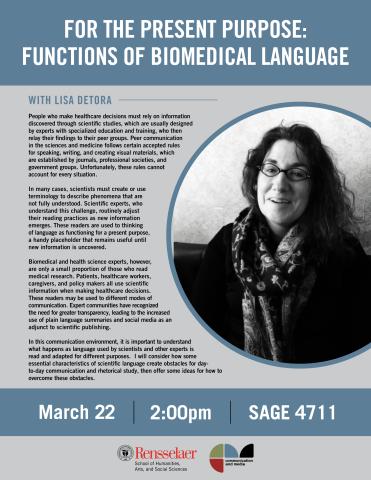
March 22
2pm - 3:30pm
Sage 4711
People who make healthcare decisions must rely on information discovered through scientific studies, which are usually designed by experts with specialized education and training, who then relay their findings to their peer groups. Peer communication in the sciences and medicine follows certain accepted rules for speaking, writing, and creating visual materials, which are established by journals, professional societies, and government groups. Unfortunately, these rules cannot account for every situation.
In many cases, scientists must create or use terminology to describe phenomena that are not fully understood. Scientific experts, who understand this challenge, routinely adjust their reading practices as new information emerges. These readers are used to thinking of language as functioning for a present purpose, a handy placeholder that remains useful until new information is uncovered.
Biomedical and health science experts, however, are only a small proportion of those who read medical research. Patients, healthcare workers, caregivers, and policy makers all use scientific information when making healthcare decisions. These readers may be used to different modes of communication. Expert communities have recognized the need for greater transparency, leading to the increased use of plain language summaries and social media as an adjunct to scientific publishing.
In this communication environment, it is important to understand what happens as language used by scientists and other experts is read and adapted for different purposes. I will consider how some essential characteristics of scientific language create obstacles for day-to-day communication and rhetorical study, then offer some ideas for how to overcome these obstacles.
Bio
Lisa DeTora is an Associate Professor of Writing Studies and Rhetoric and the Director of STEM Writing at Hofstra University, where she also serves as guest faculty in medical humanities for the Zucker School of Medicine at Hofstra/Northwell.
Lisa has published in various journals including Technical Communication Quarterly, Rhetoric of Health and Medicine, and Journal of Technical Writing and Communication, and contributed to several volumes on technical communication theory, pedagogy, gendered health communication and mental health rhetoric research. Lisa’s research interests in medical humanities and embodiment have led to co-edited volumes including Bodies in Transition in the Health Humanities (Routledge 2020) and Graphic Embodiments (Leuven 2021). A coauthor of dozens of biomedical papers, Lisa has also edited two editions of Regulatory Writing: An Overview, and served as the first author of the current Good Publication Practice for Company-Sponsored Research, which appeared in Annals of Internal Medicine in 2022.